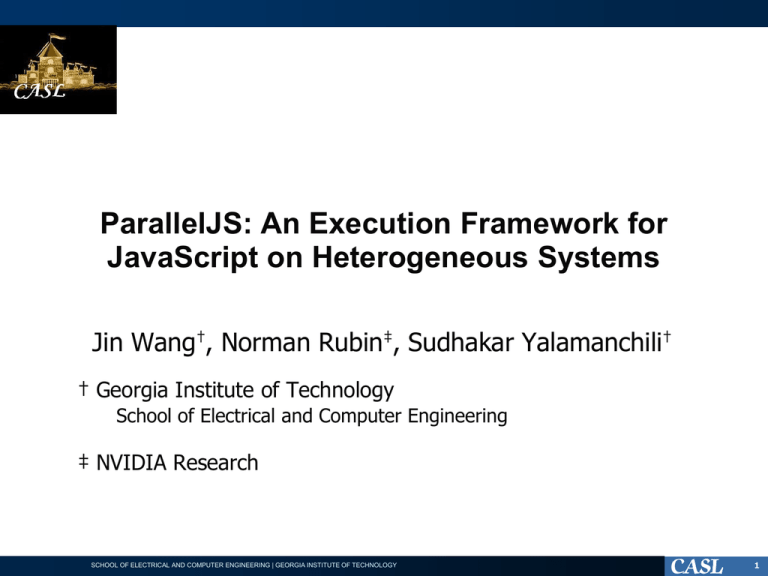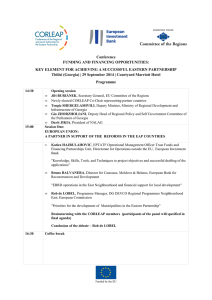
ParallelJS: An Execution Framework for
JavaScript on Heterogeneous Systems
Jin Wang†, Norman Rubin‡, Sudhakar Yalamanchili†
† Georgia Institute of Technology
School of Electrical and Computer Engineering
‡ NVIDIA Research
SCHOOL OF ELECTRICAL AND COMPUTER ENGINEERING | GEORGIA INSTITUTE OF TECHNOLOGY
1
JavaScript on Modern Architectures
Widely
used
5-20 million
programmers
PC
Server
Mobile
Security
Limited to execute in a sandbox
Link external library (C/C++) through extensions
Portability
Independent of system configuration on different platforms
SCHOOL OF ELECTRICAL AND COMPUTER ENGINEERING | GEORGIA INSTITUTE OF TECHNOLOGY
2
JavaScript Compilation
Just-in-time
Compilation
Example:
Google V8
Mozilla Firefox SpiderMonkey
Single-Threaded
Conserves determinism
Fails to utilize modern parallel architectures
SCHOOL OF ELECTRICAL AND COMPUTER ENGINEERING | GEORGIA INSTITUTE OF TECHNOLOGY
3
This Work
Goal:
Efficiently use modern heterogeneous architectures
(CPU and GPU) for JavaScript execution.
Strategy:
High-level Parallel JavaScript Constructs
Dynamic compilation and execution flow on heterogeneous
architectures
Portability: constructs can execute on both CPU and GPU
SCHOOL OF ELECTRICAL AND COMPUTER ENGINEERING | GEORGIA INSTITUTE OF TECHNOLOGY
4
System Overview
ParallelJS
Program
ParallelJS
Compiler
Native
JavaScript
Compiler
Error or GPU not
available, diverted
to CPU execution
CPU
SCHOOL OF ELECTRICAL AND COMPUTER ENGINEERING | GEORGIA INSTITUTE OF TECHNOLOGY
LLVM IR
ParallelJS
Runtime
GPU
5
ParallelJS Program
Define
High-level Parallel Constructs
Use same syntax defined by regular JavaScript
No extra language binding like WebCL[1]
Root Object:
par$
AccelArray
Basic Datatype
Utility
Constructs
map
reduce
find
filter
reject
every
some
scatter
gather
sort
scan
[1] Khronos. Webcl working draft. 2013.
SCHOOL OF ELECTRICAL AND COMPUTER ENGINEERING | GEORGIA INSTITUTE OF TECHNOLOGY
6
Construct par$.map
Example
Syntax:
out = par$.map(input, function, [context])
Multiple
Inputs/Outputs (all should be AccelArrays)
Element-wise
function
Support operations on multiple inputs and generating multiple outputs
Support neighbor element access
Context
Handle identifiers defined outside lexical scope of function
SCHOOL OF ELECTRICAL AND COMPUTER ENGINEERING | GEORGIA INSTITUTE OF TECHNOLOGY
7
Construct par$.map (Cont.)
Implementation
on CPU:
As a loop: each iteration for one element
No syntax restriction for function, anything can run on CPU
Implementation
on GPU:
Each thread handles one element
Syntax restriction for function
Basic control flows
Complex control flow cannot be handled by GPU
Side-effect free
No race condition when executed in parallel
SCHOOL OF ELECTRICAL AND COMPUTER ENGINEERING | GEORGIA INSTITUTE OF TECHNOLOGY
8
Construct par$.reduce
Example
Syntax:
out = par$.reduce(input, function, [context])
Implementation
on GPU
logN (CTA-wise and inter-CTA) parallel implementation scheme
Detailed implementation can be architecture-dependent
and is hidden from programmers
Usage of shared memory on GPU
Programmers don’t see memory hierarchy in ParallelJS
code, yet shared memory can be used to boost
performance
SCHOOL OF ELECTRICAL AND COMPUTER ENGINEERING | GEORGIA INSTITUTE OF TECHNOLOGY
9
High-Level Programming Methodology
Detailed Implementation Scheme
Grid/CTA/Threads
Global/Shared/Local Memory
ParallelJS
Programmer
GPU-dependent Configurations
Invisible to programmers
High-level
Constructs
ParallelJS
programs are typically smaller then CUDA codes
Productivity and Performance portability
SCHOOL OF ELECTRICAL AND COMPUTER ENGINEERING | GEORGIA INSTITUTE OF TECHNOLOGY
10
Example – Sum of Squares
var numbers = new par$.AccelArray([1,2,3,4,5,6]);
function square(x){return x * x;}
function plus(x, y){return x + y;}
var sum = numbers.map(square).reduce(plus);
SCHOOL OF ELECTRICAL AND COMPUTER ENGINEERING | GEORGIA INSTITUTE OF TECHNOLOGY
11
Compilation for GPU
Esprima[2]
User-defined
Function
ParallelJS
Program
Parallel
Construct
AST
Parsing
Construct
LLVMIR Library
Type
Inferernce
Written in
JavaScript
Code
Generation
LLVM IR
NVVM
Compiler
PTX
Through
Dynamic
C++ Lib
[2] A. Hidayat. Esprima: Ecmascript parsing infrastructure for multipurpose analysis. http://esprima.org/.
SCHOOL OF ELECTRICAL AND COMPUTER ENGINEERING | GEORGIA INSTITUTE OF TECHNOLOGY
12
Compilation (Cont.)
AST:
stored in JavaScript objects
Type
Inference
JavaScript is dynamically typed
Type propagation from input types
Avoid iterative Hindley-Milner algorithm
Code
Generation
Add Kernel Header and Meta to comply with NVVM
AST->LLVM Instructions
NVVM:
Generate PTX from LLVM
SCHOOL OF ELECTRICAL AND COMPUTER ENGINEERING | GEORGIA INSTITUTE OF TECHNOLOGY
13
Runtime System (on Windows Mozilla Firefox)
NVVM Lib
LLVM IR
Inputs
Firefox
Extension
Runtime
Library
CUDA Driver
Outputs
General
JavaScript
Privileged
JavaScript
DOM Event
Passing
Dynamic C/C++
Library
ctypes
Interface
DOM: Document Object Method
SCHOOL OF ELECTRICAL AND COMPUTER ENGINEERING | GEORGIA INSTITUTE OF TECHNOLOGY
14
Runtime System Cont.
Data
Transfer Management
Copy data only when accessed by CPU or GPU
Garbage collector is utilized to reuse GPU
memory
Initial Copy
GPU
Reuse
CPU
(JS)
Access Copy
Code
Cache
ParallelJS Construct code is hashed
Future invocation of the same code does not
need recompilation
Construct
2nd, 3rd, …
1st
Compile
Cached
Kernel
GPU
SCHOOL OF ELECTRICAL AND COMPUTER ENGINEERING | GEORGIA INSTITUTE OF TECHNOLOGY
15
Example Programs
Boids
Simulation
Chain (Spring connection)
Mandelbrot
Reduce
Single
Use par$.map
Use par$.reduce
Source Shortest Path (SSSP)
SCHOOL OF ELECTRICAL AND COMPUTER ENGINEERING | GEORGIA INSTITUTE OF TECHNOLOGY
Use par$.map and
par$.reduce
16
Example Programs (Cont.)
Chain
Boids
Mandel
SCHOOL OF ELECTRICAL AND COMPUTER ENGINEERING | GEORGIA INSTITUTE OF TECHNOLOGY
17
Example Program (Cont.)
Common
code structure of Boids, Chain and Mandel
1 //Sequential JavaScript code
2 function seqfn(...) {
3 for(var x = 0; x < width; x++) {
4 for(var y = 0; y < height; y++) {
5
var xy = ...computation of point (x,y)...
6
result[y*width+x] = xy; }
7}
8}
9
10 //ParallelJS code
11 function parfn(input, index) {
12 var xy= ...computation of point (x,y)...
13 return xy;
14 }
15 par$.map(input, seqfn);
SCHOOL OF ELECTRICAL AND COMPUTER ENGINEERING | GEORGIA INSTITUTE OF TECHNOLOGY
Computation body of
sequential code can
be used directly in
ParallelJS
18
Experiments Platform
High-end
desktop
CPU: Intel i7-4771 @ 3.5GHz
Memory: 32GB
GPU: Geforce Titan (Kepler GK110) @837MHz, 2688 cores, 6GB Mem
Low-end
business class laptop
CPU: Intel i7-2630QM @ 2.0GHz
Memory: 6GB
GPU: Geforce GTX525M (Fermi) @600MHz, 96 cores, 1GB Mem
OS
and browser
Windows 8
Mozilla Firefox
Google Chrome
SCHOOL OF ELECTRICAL AND COMPUTER ENGINEERING | GEORGIA INSTITUTE OF TECHNOLOGY
19
Performance Result
30
Speedup
25
20
Sequential CPU Chrome
Sequential CPU Firefox
ParallelJS GPU Desktop
ParallelJS GPU Laptop
15
10
5
0
Small
Input: ParallelJS is slower due to overhead takes most
time
Larger Input: ParallelJS is 5.0x-26.8x faster on desktop, 3.8x22.7x faster on laptop
SCHOOL OF ELECTRICAL AND COMPUTER ENGINEERING | GEORGIA INSTITUTE OF TECHNOLOGY
20
Performance Result (Cont.)
Performance
ParallelJS GPU
Native Cuda
Cub
10
5
1E+8
1E+7
1E+6
Input Size
1E+5
1E+4
1E+3
1E+2
1E+1
0
1E+0
Execution Time (ms)
CUB library
of Reduce compared with native CUDA, and
For
large input, ParallelJS has similar performance, but
incredibly smaller code size
SCHOOL OF ELECTRICAL AND COMPUTER ENGINEERING | GEORGIA INSTITUTE OF TECHNOLOGY
21
Performance of SSSP
Compare
Graph
Nodes
Edges
Time(ms)
Speedup
USA-Road
1,070,376
2,712,798
18,685
0.86
ra-2e20
1,048,576
4,194,304
1,215
0.6
Rmat20
1,048,576
8,259,994
3,645
0.59
ParallelJS
with CUDA SSSP (lonestar benchmark[3]) on GPU
is always worse
Use backward algorithm instead of forward algorithm used by CUDA
Inevitable because JavaScript does not support atomic operation
The limit of current ParallelJS framework: does not support complex GPU
features
[3] M. Kulkarni, M. Burtscher, C. Cascaval, and K. Pingali. Lonestar: A suite of parallel irregular programs. In ISPASS
'09: IEEE International Symposium on Performance Analysis of Systems and Software, 2009.
SCHOOL OF ELECTRICAL AND COMPUTER ENGINEERING | GEORGIA INSTITUTE OF TECHNOLOGY
22
Performance Breakdown for Boids_2K example on
laptop
ParallelJS
13ms¶
14ms¶
LLVM
PTX
Code
Cache
Privileged
JavaScript
C/CUDA
1ms¶
Data
Transfer
1.92ms*
Kernel
Execution
5.82ms*
: Measured in JS
*: Measure in CUDA
¶
SCHOOL OF ELECTRICAL AND COMPUTER ENGINEERING | GEORGIA INSTITUTE OF TECHNOLOGY
23
Compare with Related Work
WebCL
Foreign language binding into JavaScript
Programmers need to learn OpenCL
JSonGPU[4]
Expose GPU concepts to JavaScript programmer
Ex. HJ.threadID.x, HJ.blockID.x
Complicated programming API
HJ.setupKernel(…)
RiverTrail[5]
Prototype: uses OpenCL backend, tends to use extra memory
Production: more focus on SSE, and multi-core
[4] U. Pitambare, A. Chauhan, and S. Malviya. Just-in-time acceleration of javascript.
[5] S. Herhut, R. L. Hudson, T. Shpeisman, and J. Sreeram. River trail: A path to parallelism in javascript. SIGPLAN Not.,
48(10):729{744, Oct. 2013.
SCHOOL OF ELECTRICAL AND COMPUTER ENGINEERING | GEORGIA INSTITUTE OF TECHNOLOGY
24
Conclusion
ParallelJS:
a framework for compiling and executing
JavaScript programs on heterogeneous systems
Use high-level constructs to hide GPU-specific details
Automating the decision of where to run the code
Productivity and performance portability
Limited use of advanced features of GPU
Future
direction
Embedded and fused architectures
Adaptive decision of running on CPU/CPU for power efficiency
Support of advanced GPU features
SCHOOL OF ELECTRICAL AND COMPUTER ENGINEERING | GEORGIA INSTITUTE OF TECHNOLOGY
25
Thank you!
Questions?
SCHOOL OF ELECTRICAL AND COMPUTER ENGINEERING | GEORGIA INSTITUTE OF TECHNOLOGY
26







